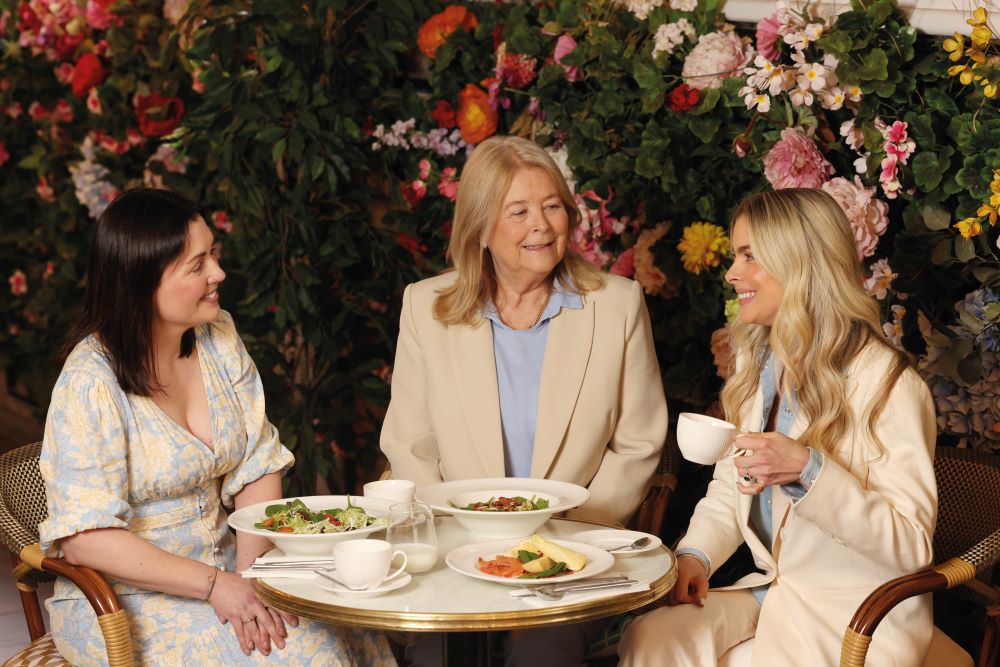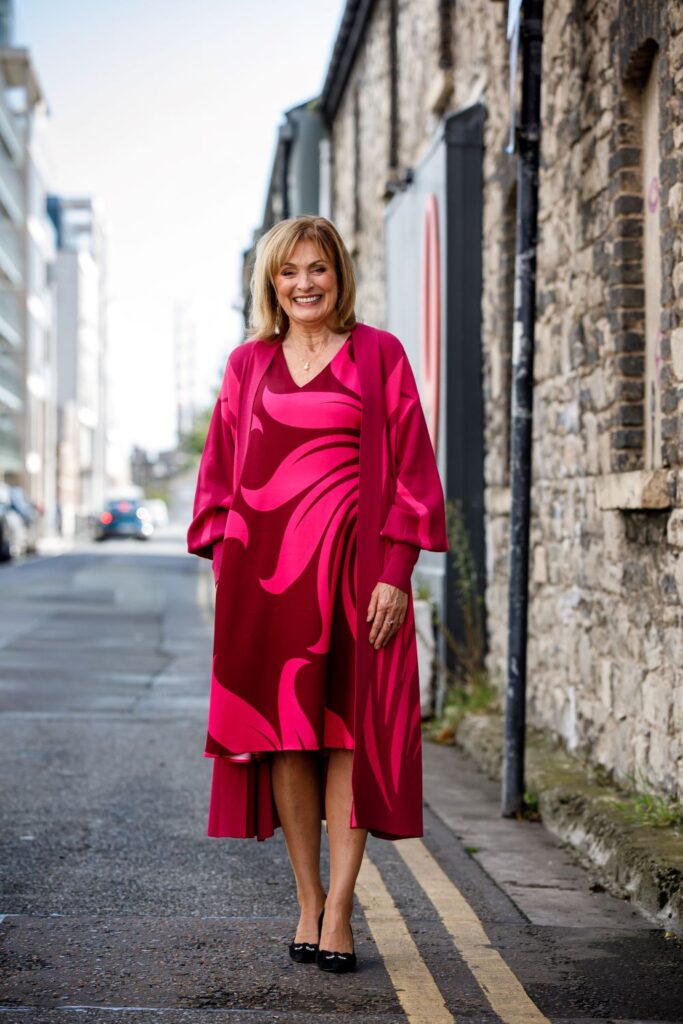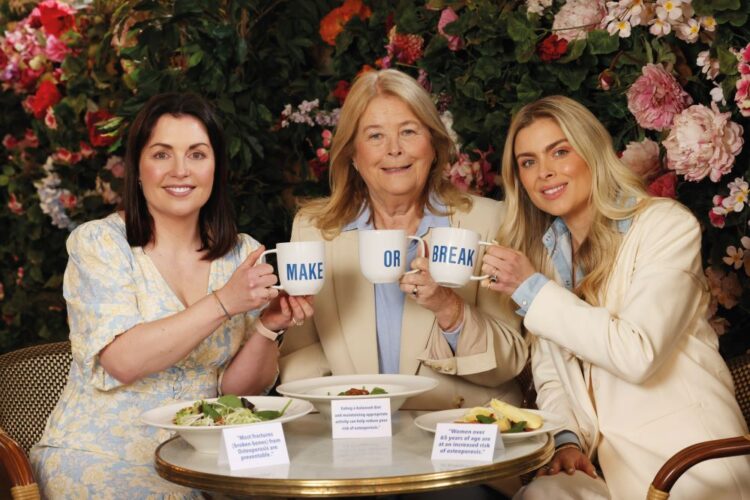Organised by Amgen in association with the Irish Osteoporosis Society.
When it comes to women’s health, how often do we think about or talk about our bones? Not as often as we should be, that’s for sure. That’s despite the fact that, in Ireland, the statistics are sobering: around 300,000 people are living with osteoporosis, a health condition that weakens bones, making them fragile and more likely to break.
Roughly 75% of osteoporosis-related fractures happen to people aged 65 and over, and women are at greater risk than men, in part due to the drop in oestrogen levels after menopause. Even more concerning, the number of osteoporosis-related hip fractures in Ireland is expected to rise dramatically; from 32,000 to 51,000 a year by 2034, an increase of nearly 60%.
Often called the “silent disease”, osteoporosis can develop unnoticed over many years until a break or fall brings it to light. This is because there are no signs or symptoms that a person is losing bone.
That’s why the ‘She Doesn’t Deserve a Break’ campaign is being re-launched with a renewed call to action aimed at encouraging women over 65 to make time for their bone health, and for all of us to break the silence around osteoporosis.

Ultimately, we need to reframe how we all think of bone health, and prioritise it in our lives and the lives of our loved ones. It’s time for everyone to support the women in our lives by sparking up those vital conversations about bone health with family, friends and in our communities. By encouraging these conversations, we can help the women we love take proactive steps to protect themselves.
Pharmacist and campaign ambassador Jess Redden, joined by her mother Linda Redden, is urging people to check in with the women in their lives about their bone health. “Osteoporosis affects real women, real families, and we can help prevent the consequences of it, such as broken bones (fractures), by taking action now,” she says. “It is vital that we, the people in women’s lives who are over 65, encourage conversation around their bone health. We’re calling on daughters, sons, nieces, husbands and friends to support women in their lives over 65, and to encourage them to take control of their bone health by speaking to their GP or visiting www.irishosteoporosis.ie. Make time to have meaningful conversations and break the silence around osteoporosis”.
The message is clear: women’s bone health can’t wait. A simple conversation can lead to early diagnosis, better bone strength, and potentially even save someone from the pain and complications of a serious fracture. The campaign urges everyone to visit www.irishosteoporosis.ie for more information, resources, and guidance on how to approach this vital topic. Because she doesn’t deserve a break, but she does deserve your support.

Renowned broadcaster Mary Kennedy is a longstanding ambassador of the ‘She Doesn’t Deserve a Break’ campaign. she is keen to raise awareness about osteoporosis and advocate for proactive bone health
You have been a vocal advocate for taking bone health seriously. Tell us more about this passion you have for spreading awareness about the risk factors of osteoporosis and how important bone health is in maintaining our independence?
I was interested in athletics from a young age. Building strong bones was part of it. My mother always encouraged us to be healthy in every way. We drank milk at mealtimes. We took cod liver oil capsules and other bits and pieces. Good health including bone health was a priority growing up. I’d encourage parents today to focus on that with their children. It pays dividends.
What does minding your bone health look like in your own day-to-day life?
I used to jog daily, but I now do a fast walk. I also lift weights four times a week. Thirty minutes a day of appropriate weight bearing exercise, such as walking, can help to keep you independent. Appropriate exercise is very important to help reduce your risk of bone loss and to help improve your bone strength. Movement is good. I love gardening – there’s lots of stretching in that, up and down! I stand up from the chair without holding onto it. I always take the stairs instead of a lift. These are the exercises that I know are safe for me. However, it is important that those with bone loss are individually assessed by their doctor to see what is safe for them to do first. Nobody should underestimate the type of movement that is worthwhile doing and that is part of daily life.
How do you stay on track when your schedule gets busy?
I believe in consistency. I think the important thing is not to be too hard on ourselves and when life is busy, there’s a reason for that. There’s probably exercise taking place in that busyness, and also satisfaction. The important thing is to get back at it and pick up from where I left off when the busyness recedes. Almost 7 out of 10 older women in Ireland have not been diagnosed with osteoporosis putting them at risk of breaking bones (fractures).
Do you think people underestimate the importance of prevention because the effects of osteoporosis aren’t visible until it’s serious?
The whole purpose of the osteoporosis awareness campaign is to alert people to the possibility of prevention. I would hate to lose my independence, even for a short space of time, due to a fall or a fracture (broken bone). Being bone health aware makes good sense so that as we age, we can enjoy life fully.
How do you encourage others to take those first proactive steps, particularly those who think it’s too early — or too late — to start caring about their bone health?
Campaigns such as this one are highly effective. As is word of mouth. The bottom line is, it is never too early or too late to take measures to improve bone health. And that’s good news!
A key message from this campaign is that women particularly aged over 65 should make the time to speak to their GP about their bone health and the risk factors of osteoporosis, and to get a DXA scan if needed to assess their bone density. This is something you did – can you tell us more?
I think a DXA scan is so important. As we’ve said – the problem a lot of people face is that they don’t realise that they are losing bone mass and that their bones have weakened due to osteoporosis until they have a fall and unfortunately break a bone. Why not keep your bone health up to date with a scan? Just like we have blood tests, to keep an eye on general health. A DXA scan is a 10-20 minute non-invasive, low dose X-ray scan that is used to measure the density and strength of your bones. It is completely painless, and it is not claustrophobic. Doctors may use it as part of their overall assessment, alongside a review of clinical risk factors to diagnose osteoporosis. I would absolutely encourage women over 65 to have a conversation with their GP about osteoporosis, because women 65+ are most at risk.
Women need to advocate for themselves.
Yes, they should make time for their bone health, be empowered, and inform themselves more about osteoporosis, especially the risk factors for it. They can do this by visiting www.irishosteoporosis.ie, then they should follow up by having a conversation with their GP about their bone health. Their GP will determine if a DXA scan is appropriate.
Read more inside the July|August edition of Irish Country Magazine, out now.








